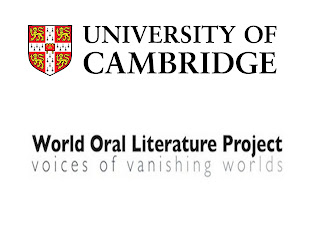In many cultures around the world knowledge is passed on
orally. History, legends, myths, folklore, songs, traditions, even genealogies are
passed on by word of mouth. The majority of these oral traditions have no
written record, if a language dies its oral traditions die with it.
Worldwide languages are disappearing at a rate of roughly 26 languages
per year. Many of the dying languages are oral languages with no written form. These
languages have rich oral traditions but all that knowledge can only be accessed
by finding someone who still knows the stories.
If, for example, English were in the same situation as these other
languages then things like the story of Robin Hood, Mother goose’s nursery rhymes,
the ABC song and much more would disappear.
In an effort to prevent the loss of these oral traditions,
the University of Cambridge has undertaken a project know as The World Oral
Literature Project. According to Cambridge, ‘The World Oral Literature Project is an urgent global initiative to document and make accessible endangered
oral literatures before they disappear without record’
Established in January of 2009 the World Oral Literature Project has successfully
completed six projects (http://www.oralliterature.org/grants/grantees.html)
and started several more. Each project works with different cultures and strives
to preserve the orature of that culture. The projects include audio recordings in
addition to written documentation. This way the documentation preserves some of
the feel of the oral traditions as well as the actual story.
The WOLP is one of many organizations working to preserve culture
worldwide, but there is still a long way to go. While we don’t want cling to
the past at the expense of the future, we stand to lose a great deal if we lose
the oral literature of these cultures. We could do far worse than to learn of
the vast stores of knowledge found in cultures all over the world.
http://www.oralliterature.org/
http://travel.nationalgeographic.com/travel/enduring-voices/

No comments:
Post a Comment